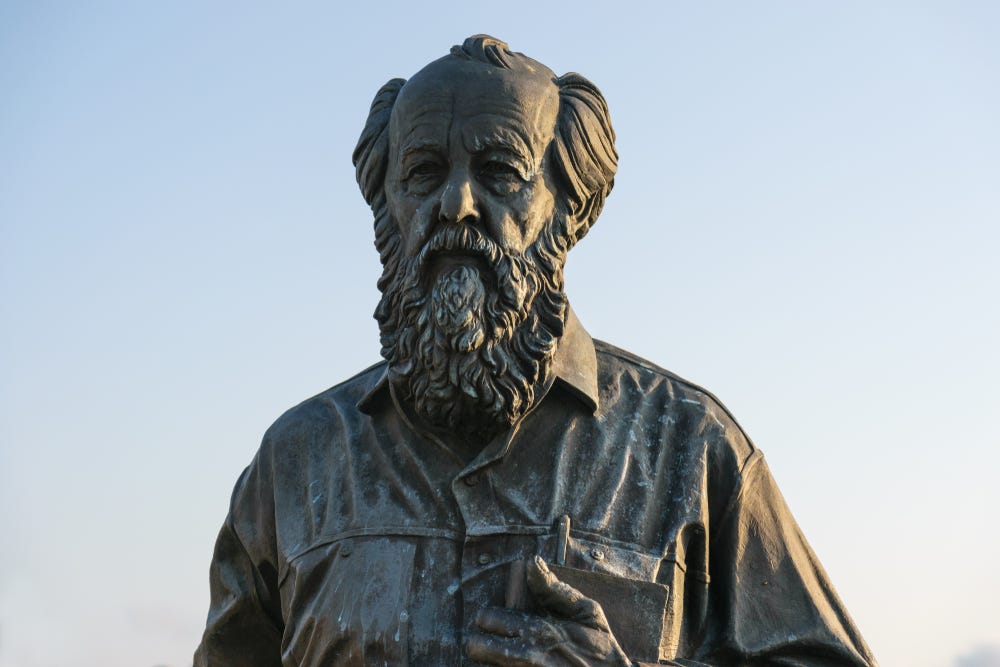E-Pluribus | August 9, 2021
We can still learn from Solzhenitsyn, a 42 ton monument to pointless "anti-racism" efforts, and a case for not debating.
A round up of the latest and best writing and musings on the rise of illiberalism in the public discourse:
David P. Deavel: Thinker, Artist, Warrior
At City Journal, David Deveal reviews a 2020 translation of Book 2 of Aleksandr Solzhenitsyn’s Between Two Millstones. Deveal points out that Solzhenitsyn’s critique of the American media at times sounds positively Trumpesque, but on a more serious note finds lessons for today in the famous dissident’s ideas on restoring post-Soviet Russia.
Once a darling of the media but now despised, the old man continues to heap abuse on the media as the “loony left press,” comparing them constantly to “Soviet era newspapers.” He says American news outlets tend to “trumpet” their narratives “in unison” in order to “bamboozle America’s reading public,” though in his populist fashion he says this maneuver “doesn’t affect average Americans at all.”
Donald Trump from Mar-a-Lago in 2021?
Try Aleksandr Solzhenitsyn from Cavendish, Vermont, in the 1980s…
[…]
Today, as America seems more fractured than ever before, Solzhenitsyn’s reflections on how to restore Russia to a state of ordered liberty seem especially pertinent. No theocrat, he did believe, as he said in the Templeton Address, that the modern problem was that “Men have forgotten God.” But he also believed that piety was no substitute for hard thought, spiritual substance, and practical action. His reflections on the need for something more than “the Market” for “a nation’s life” are accompanied by an understanding of the kind of plurality of authorities that can ensure that government stays a servant of the people and not the reverse. Summarizing his booklet Rebuilding Russia, he noted that his principled proposals involved: “‘A Combined System of Government,’ consisting of a rigid vertical to run the state from the top down and a creative zemstvo [smaller local authority] vertical, working from the bottom up—various electoral systems (proportionality, plurality, and absolute majority)—and how to avoid the nation becoming exhausted, their lives in turmoil from these elections.”
Read it all here.
Dan McLaughlin: Anti-Racism Reaches Its Most Ridiculous Low Yet: $50,000 to Move a Rock
There are no awards for Most Pointless Victory Against Alleged Racism, but if there were, this past week delivered a serious contender. Dan McLaughlin at National Review writes about how a giant boulder unearthed 96 years ago and described with crude racist language in a single newspaper article was reimagined as an iconic monument to racism that needed to come down despite a complete lack of evidence that the geological wonder symbolized anything of the kind.
On Friday, the University of Wisconsin at Madison struck a blow against racism in today’s America. No, who am I kidding? It paid $50,000 to move a rock from one campus to another because of a word written about the rock in a newspaper article almost a hundred years ago[.]
[…]
That’s it. That’s the whole case for doing this. There isn’t, so far as I can tell, any complaint with Chamberlin, whose profession as a geologist makes a 42-ton boulder an appropriate memorial. There is nothing about anything that has been said or done since 1925. All this is about just one reference in a century-old newspaper clipping, which someone must have gone to great lengths to locate in order to claim that current black students at UWM walk around feeling oppressed by a 1925 edition of the Wisconsin State Journal. We are told that the rock’s relocation was funded by private donations, so at least the taxpayers of Wisconsin are not on the hook, but consider how few worse ways there are to spend $50,000 in today’s America — money that presumably was raised from university donors. The boulder will still sit on university property.
Read it all.
John McWhorter: Kendi and DiAngelo Don’t Debate People Like Me
While encouraging dialogue between opponents is one of our baseline principles here at Pluribus, John McWhorter pushes back against the “why is my opponent afraid to debate me” battlecry that is often heard these days. McWhorter suggests that sometimes disagreement is sharp and clear enough to make face to face confrontation pointless and a waste of time.
[G]iven the way people like me or Glenn Loury have discussed people like Kendi and DiAngelo on line and in print, how reasonable is it to expect them to “debate” us? I wasn’t nice to White Fragility last year and meant it, as that review needed to be written – but fully get why DiAngelo thereafter did not want to appear with me on Morning Joe. I didn’t write that review expecting DiAngelo to put on the gloves and “debate” me – I knew full well it meant that sometime in the future we’d be in a talk show green room carefully avoiding eye contact. Glenn has called Kendi an “empty suit” in our conversations and it has gotten around; I guarantee that I would never appear on the show of someone who called me that.
Some may be thinking that people like that are responsible for defending themselves in public competition, that this is the burden of the public intellectual. But the question is why they are supposed to do this in a live, back-and-forth sparring match.
Life is short. Why should someone spend even an hour or two of their time engaging with someone who has given all indication that they heartily disapprove of their work and even find them off-putting personally? Whether it was about winning or losing, who does this?
Read the whole thing.
Around Twitter:
Geoffrey Miller comments on the Madison racist rock in item #2 above:
More on the rock from Thomas Chatterton Williams:
A thread from Wesley Yang on the need for and demand for a reality-based-news business model:
Finally, intersectionality of a different type - politicians and advocacy groups - has hit the Andrew Cuomo scandal:









